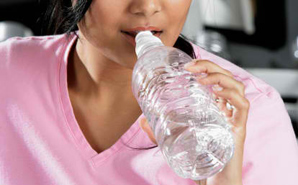Nurses know that water is essential to human life – a person can survive for about three weeks with no food, but will perish after only about a week with no water. An adult body, after all, is about 60% water. And yet, most Americans are mildly dehydrated, according to Harvard researchers. You’re continually losing water through your breath, perspiration, elimination, etc. Adequate fluid intake helps make you healthier in so many ways, by nourishing absolutely every cell in your body.
How do you know if you’re running low on vital fluids? Here are three warning signs:
Check your intuitive and physical fluid gauge.
Are you thirsty? That’s the best way to judge if you’re dehydrated. Sometimes, though, you lose water faster than your body’s thirst mechanism registers the depletion. (During a sweaty workout in the hot sun, say.) Another excellent indicator is the color of your urine: It should be pale yellow. If it is often dark yellow, definitely drink more water.
There are other symptoms of dehydration, such as slight fatigue, mild headaches, dry throat, rough couch, and constipation. Other, more serious symptoms take longer to show up and may be harder to pinpoint: kidney stones and bladder cancer, for instance.
Check the scientifically recommended fluid gauge.
According to the Institute of Medicine, an average, healthy adult living in a moderate climate needs about 13 cups (men) and 9 cups (women) of fluid a day. That’s close to the “Drink eight 8-ounce glasses of water a day” advice that’s been popular for years. The “8 x 8” rule is a catchy slogan that’s easy to remember and yet still agrees with the current scientific evidence.
Check for exceptions that may re-jigger your fluid gauge.
Any physical condition that makes you perspire or otherwise quickly lose bodily fluids requires a higher fluid intake in order to stay hydrated. For instance: Do you exercise strenuously? Do you live in a hot or humid climate? Are you breathing heated indoor air? Are you experiencing fever, vomiting, or diarrhea? Are you pregnant or breast-feeding? In certain situations, special drinks (with electrolytes) or medical intervention may be necessary to make up for rapid fluid loss.
Happily, most of the time the solution for dehydration is simple: drink eight cups daily, with water as your beverage of choice. If you keep a thermos on your desktop and sip from it throughout your shift, you’ll easily stay hydrated. Only drawback: more trips to the restroom, something that nurses often find difficult to fit in. But that’s another blog post topic!
What’s your hydration situation? Please share your tips, tricks, and tools for quenching thirst.
- Resumes, LinkedIn, and HR Portal Profiles, Oh My! - May 22, 2020
- Weight Management for Nurses: The Why’s and How’s of Losing or Maintaining Weight - February 18, 2020
- Mindfulness and Wellness Programs for Patients - October 14, 2019



